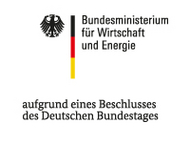BMWi-project: ORBIT
BMWi projekt ORBIT –  Optimization of a trickle-bed-bioreactor for dynamic microbial biosynthesis of methane with archaea in power-to-gas plants
Optimization of a trickle-bed-bioreactor for dynamic microbial biosynthesis of methane with archaea in power-to-gas plants
The BMWi project pursues the research question, how the biological methanation in the trickle-bed-reactor can be optimized as far as it is a competitive alternative for industry to the upgrading of electrolytic hydrogen to methane.

Support Code: 03ET6125B
Term: July 2017 – December 2020
Research program
Forschungsförderung im 6. Energieforschungsprogramm ‚Forschung für eine umweltschonende, zuverlässige und bezahlbare Energieversorgung‘
![]()
OTH Regensburg

Universität Regensburg

Electrochaea

MicroPyros

Viessmann

Westnetz

Projektbeirat: DVGW
Electricity generation from renewable sources is an important part of the energy transition and the climate protection. However with the generation of green electricity the challenge of increasing storage capacities arises. A possible way for storage is storing the electricity in form of hydrogen by use of electrolysis (power-to-gas) with upgrading it to methane which can be fed into the natural gas network. Through this the entire natural gas infrastructure can be used to store the “green methane”. ORBIT observes the whole process chain of storage with the focus on methanation. This is done via the innovative concept of the biological methanation.
The biological methanation works with the help of microorganisms, so-called archaea. The archaea produce methane as a metabolic product via the methanogenesis. They live in a fluid phase at moderate conditions (T=30-110°C) and pressures from 1 bar under anaerobic conditions. Therefore the reactor has to be oxygen-free and the reactants hydrogen and carbon dioxide have to be brought into solution. In particular the solution of the gases hydrogen and carbon dioxide is the limiting factor of the biological methanation, which is why a trickle-bed reactor is built in the project ORBIT.
For that reason a 50-liter trickle bed reactor is specially designed and built for the requirements and in holistic view between biology, process engineering and plant construction. This will be tested and optimized hydrodynamically and operated with special selected microorganism strains. First as a research reactor and in the final phase at real operation for test purposes at the power-to-gas location Ibbenbüren.
Contact:
Department of Chemical and Biological EngineeringThomas Trabold, M. Sc.
Lehrstuhl für Energieverfahrenstechnik
Department of Chemical and Biological EngineeringDr.-Ing. Peter Treiber
Lehrstuhl für Energieverfahrenstechnik


